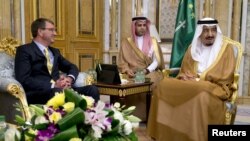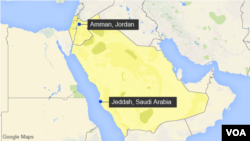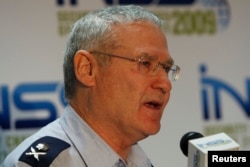U.S. Defense Secretary Ash Carter met with Saudi Arabia's King Salman Wednesday, as part of a regional tour aimed at convincing skeptical allies about the benefits of the Iran nuclear deal.
After his meeting, Carter told reporters the king is expected to visit Washington in the fall.
Saudi officials have neither publicly condemned nor endorsed the Iran nuclear agreement announced July 14.
Carter met with King Salman as well as the Saudi minister of defense. Later, he flew back to Jordan for a meeting with the Jordanian military leadership.
Carter said ahead of his trip that he aimed to discuss American strategy to counter "Iranian aggression" in the region, as well as the fight against the Islamic State group.
Officials said Carter and the king were to discuss cooperation with Saudi Arabia in areas such as missile defense and cyber and maritime security.
On Tuesday, Carter met with coalition troops in northern Jordan at an air base from where operations against targets in Syria are launched.
He flew to Jordan from Israel, where he had met with Prime Minister Benjamin Netanyahu to provide reassurances of continued U.S. security support following the Iran’s nuclear agreement.
Netanyahu greeted Carter with a somber face before going into nearly two hours of talks at his office in Jerusalem.
Later, Carter said of the Netanyahu talks, "We don't agree on everything. And the prime minister made it quite clear that he disagreed with us with respect to the nuclear deal."
'Historic mistake'
Netanyahu issued a statement late Tuesday calling the Iran agreement "a bad deal" and "a historic mistake."
"It will put Iran at the threshold of an entire nuclear arsenal within a decade, because at that time the deal permits Iran to build as many centrifuges as it wants and to enrich as much uranium as it wants, which means that Iran could break out in a decade or so to dozens of nuclear bombs in zero time," the Israeli leader said.
Carter is the first Cabinet-level U.S. official to visit Israel since Iran agreed last week to curb its nuclear weapons program in exchange for a partial lifting of economic sanctions against it.
Relations between the United States and Israel have been strained by the agreement.
Netanyahu criticized it as a “bad deal of historic proportions” and pledged to combat it through allies in the U.S. Congress.
Israeli politicians, including most of the opposition, also condemned the deal.
Many Israeli analysts criticized the deal, saying the U.S.-led Western powers "caved in" because of a lack of appetite for another war in the Middle East.
But other analysts, including many former military and intelligence officials, weighed in to say the deal was not that bad.
Amos Yadlin, director of Tel Aviv’s Institute for National Security Studies, called it "a highly problematic agreement that entails risks to Israel’s national security,” but he added that comparing it to a "dream agreement" whereby Iran would stop enriching uranium is unrealistic.
"Had no agreement been reached," said Yadlin, "the infrastructure existing in 2013 [when the negotiations began] would have expanded even further to the point of immediate breakout capability, with no inspection regime in place."
The former director of the Mossad intelligence service, Ephraim Halevy, put it more succinctly: "Don’t fight with America."
Scott Bobb contributed to this report from Jerusalem. Some material for this report came from Reuters.







